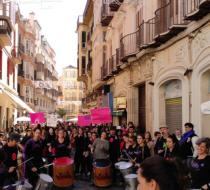La Casa Invisible Protests Against Gentrification Favorite
La Casa Invisible project was started in 2007 in Malaga, Spain, when a group of socially involved participants squatted in a run-down building, aiming to eventually claim the legal rights to the property (Moor & Smart, 2016). The space was opened to local artists and creators, quickly becoming a hub for free local music, performances, and seminars as well as creating an important meeting space for social groups (Moor & Smart, 2016). Despite back-and-forth disputes with Malaga’s city council and other public corporations, and attempts by the government to reclaim the building, La Casa Invisible became a space for community engagement free of the hands of the government or large corporations (Moor & Smart, 2016)
Gentrification is taking over cities all over Spain, bred by corporations' need for capitalist gain, using the facade of creating cool, artsy areas while privatizing important public spaces (Moor & Smart, 2016). Gentrification pushes out the local population by drawing in non-citizens and tourists through trendy hotels, restaurants, museums, and attractions, eventually raising the cost of living (Castro-Noblejas et al., 2022). La Casa Invisible is a great example of a city using its community to fight back against the gentrification they face.
In objection to eviction attempts, the community of La Casa Invisible has staged protests many times in the last few years bringing the heart of the La Casa into the streets by introducing musical and theatrical performances, glimpses into everything that happens regularly in La Casa Invisible, as part of their protests (lainvisible.net). One participant says “‘Our protest won't be a simple march. We are known for performing and for uniting the cultural with the social” (Pinto, 2021). This voice demonstrates the core concept that flows through the ideology of La Casa Invisible, that art, culture, activism, and community are all intertwined. For La Casa, art and social change go hand in hand.
La Casa fundamentally works outside of the systems that encourage capitalism and gentrification, and it provides voices to the locals. Truly public spaces are essential to democracy because they are “spaces where normalized ways of thinking and acting may be challenged” (Vilaseca, 2011). Therefore, La Casa Invisible isn't just fighting for its building, they are fighting for so much more, they are fighting to ensure the survival of democracy by advocating for public spaces.
The way that La Casa Invisible brings their art their activism is essential to portraying their message of community. Demonstrations involving creative performances, like those done by La Casa Invisible, make an impact, showing the opposition that their community is here, organized, and thriving, and that they deserve rights to the places in which this art is made.
Photo Credit: Lainvisible.net
Sources:
Castro-Noblejas, H., Sortino-Barrionuevo, J.F. and Reyes-Corredera, S. (2022) “Proceso de gentrificación de un espacio degradado convertido en escaparate cultural. El Caso del Centro Histórico de Málaga.,” Revista de Estudios Andaluces, (43), pp. 8–31. Available at: https://doi.org/10.12795/rea.2022.i43.01.
Pattern, L. (2022) "in Lavapiés, all of us have the right to be safe", Madrid No Frills. Available at: https://madridnofrills.com/in-lavapies-all-of-us-have-the-right-to-be-safe/ (Accessed: December 5, 2022).
Pinto, C. (2021) La Casa Invisible, a Malaga association with ideas to fight eviction, Sur in English. Diario Sur. Available at: https://www.surinenglish.com/malaga/malaga-city/casa-invisible-malaga-20... (Accessed: December 5, 2022). Por Tercera Vez en 2022, La casa invisible sale a la calle en contra del desalojo (2022) La Casa Invisible - Centro Social y Cultural de Gestión Ciudadana. Available at: http://lainvisible.net/es/node/1308 (Accessed: December 5, 2022).
Moor, A. and Smart, A. (eds) (2016) “Making Room Cultural Production in Occupied Spaces,” Other Forms and the Journal of Aesthetics and Protest [Preprint]. Translated by M.R. Magaldi.
Vilaseca, S.L. (2011) “The triball case: ‘Okupación creativa ¡ya!" vs. Okupa hacktivismo,” Arizona Journal of Hispanic Cultural Studies, 14(1), pp. 11–30. Available at: https://doi.org/10.1353/hcs.2011.0400.








